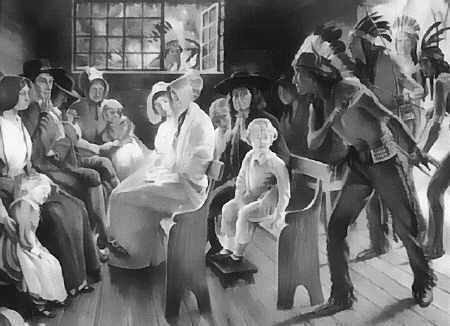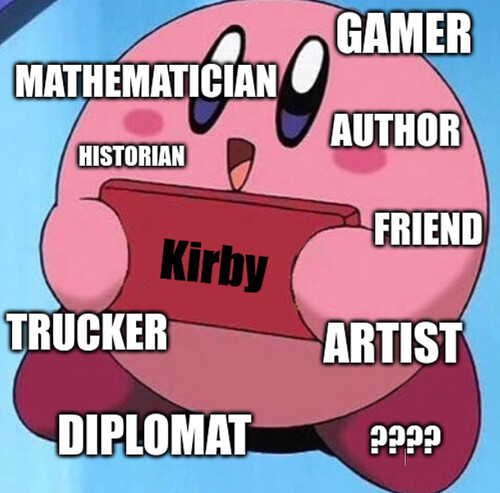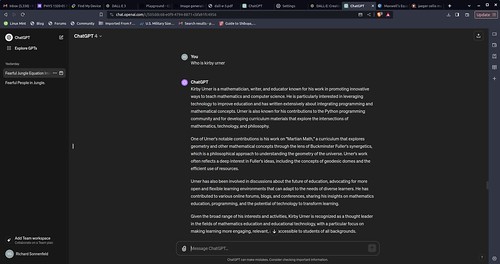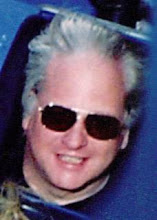Thursday, March 28, 2024
Tuesday, March 26, 2024
Diaspora Nations
Where I start with New Palestine, or Palestine for short, is it's a Diaspora Nation to begin with, as was Israel in the sense many people give the word, even through it had no existence as a jigsaw puzzle piece on the UN game board at first, much as Palestine doesn't today.
Sure we see those maps of shrinking land areas, but those never belonged to a bona fide state, or people wouldn't be clamoring how we still need a state. I'm seeing "Diaspora Nation" and "University" (global network of campuses or bases) as essentially synonymous.
US citizens, counting expats and those deployed to bases outside the US, likewise comprise a Diaspora Nation of sorts. Citizens intermingle. The planet is such that Chinese, Guatemalans, Koreans and Irish Catholics all live in the same cities, even if having, in some cases, their own small and large businesses, schools, travel and real estate agents, restaurants, journalists and so on.
Imagine a Palestine, not typecast as "Muslim" (yet serving many Muslims), not an "ethno-state", that owns a fleet of cruise ships, has skyscrapers in many great cities, scattered farmlands, hotel and rental car chains.
The idea of a "government" owning these things sounds socialistic, but let's talk about a mix of public and private sectors, and let's have no large militia given no extensive borders to defend, but lots of holy sites and many lands to develop (e.g. Guantanamo Bay if the Cubans buy in), so we need an army of engineers.
The same facilities might be shared among several Diaspora Nations in many cases, as when we place new stadium-shaped Old Man River style bases around the world.
We might make these agreements without waiting for big wheels to turn slowly, in the UN or wherever. As private entities, we're free to get on with the formulation of our global states university system, our Promised Land.
Sunday, March 24, 2024
The Nonstop Love-in
That's the title of Johnny's new (and first) book, in all caps. Johnny Stallings, a veteran of these journals (blogs). Nick Consoletti, a premier networker, made me aware of this guy, who could memorize entire Shakespeare plays, and perform them, as one man shows. His stamina is that of a high athlete. Whatever's the mental equivalent: he's in shape that way too.
The invite popped up on Facebook, with his picture on the cover. The event was at a neighborhood coffee shop and grocery store, after hours, in one of those hard to navigate niche neighborhoods, wedged between main arterials and made maze-like with one way and blocked off streets. I used to work in this neighborhood, for CUE, by then back with EMO just down the street on Bancroft.
The venue was packed, with folks queued to get their signed copies. I took a seat right away, assuming I'd get my opportunity to buy one later, and I was right. Johnny read excerpts from his book amidst adoring fans. The guy is a renowned playwright and thespian, and poet, in these parts. He's a Whitman aficionado. and I'm join him in celebrating that guy, in chapters past, when Nick was with us.
Stallings spent thirteen years doing workshops in male prisons, with the work spilling over into the women's prisons, as we later heard from the audience. Sometimes he'd stage plays, but a lot of the time it was just to gather people and do scripts or whatever. I was not part of his inner circle of volunteers and have only bumped into him randomly, on Mt. Tabor, at the bank, a few times in recent years. But I follow from a distance. This was a great opportunity to reconnect.
I only just bought the book last night and haven't sat down with it, but based on his readings, I'm already sure I'll be loving it. He well knows the book might come across to some as pollyanna, artificially upbeat where life is more complicated. Here it helps to know his audience: that prison population, already maxed out on misery, deprived of freedom, and not needing an education in how to be down and out. Johnny was that little dot of yin in a yang world, or of yang in a yin world, providing hope it'll all turn out someday, the wheel of life.
Tuesday, March 19, 2024
About Quakers
[an excerpt from a math4wisdom post]
In my post-military and/or slightly para-military asylum city refugee camps, we keep the fun parts (helicopters) and lose the dumb parts (e.g. murder, mayhem...)Quakers, eventually a business-oriented bourgeois sect, evolved as a part of the trend away from organized religion and the oppressive tyranny of the English caste (class) system. Per Quaker lore, we invented fixed pricing which made wholesale / retail catalogs possible (it didn't matter what your title or position in society was). We owned Barclays Bank, Lloyds of London, Cadbury Chocolate... (but never the Quaker oats company).
A newish book called Quakernomics (not by Quakers) documents their middle-class capitalistic utopianism, which was centered around the idea of a company town, with jobs, health care and education for all. Most industrialists didn't care for this socialistic model, but it's part of New England Transcendentalism as well, this impulse to form egalitarian communities that are also prosperous (not unlike the kibbutzim in some ways, although I'm no expert).
We (the Quakers) reached our apex in power during the industrial revolution in England. Pennsylvania was to be our utopia but we were quickly outnumbered by other Anglo-Euro immigrants eager to engage in Indian Wars and other forms of awkward jerkiness characteristic of their clans.
Quaker Rufus Jones helped establish the American Friends Service Committee (AFSC) as the Quakers' social action arm. I've worked with AFSC quite a bit over the years, in various capacities, lots in my online journals.
Founder George Fox, popular in some military circles, advised worshippers to escape the "steeple houses" (everyday churches) and join him in talking to God directly, yet collectively, in a silence imbued with a sense of expectancy, and from meetinghouses instead (no steeples).
Religious Society of Friends is the formal name, and comes from a passage in John wherein Jesus says he wants friends, not servile servants and sycophants.
Monday, March 18, 2024
Show & Tell
What are the dynamics of learning a practice? Draw your experiences from any and every corner of your life.
What I come up with is we need to talk about the role of peers, how to work with them, in addition to who and what are they.
Let's go back to a classic classroom of kids at their desks, teacher up front, like we see in so many movies. The peers are the students, and they check each other out, for looks, for behaviors, for cues, for clues. They also check out the teacher, and learn from student teacher interactions. How the adult in the room behaves with peers one's own age, is of interest, in addition to the subject matter.
Suppose the teacher encourages show & tell, meaning she or he sets aside time during meetups for lightning talks, meaning students showcase their own work for minutes at a time. Perhaps these sessions get recorded. Perhaps students have access to the raw recordings and edit together their own works, in turn topical in show & tell (like in a filmmaking class).
A core purpose of Show & Tell is to give peers a way to assess their own performance relative to the class material, and not just relative to classroom theatrics, which I reiterate are not irrelevant. They do this by comparing their own increasing level of mastery with that of others.
Some life coaches will butt in to say one should never compare. I say always compare but not in the judgey way of "who's better?" because in a multidimensional space (most of them are) there's no obvious "better" dimension. Develop your tastes. Learn to articulate them.
If I all walk into the same class knowing nothing about sculpting with clay (the "even playing field" metaphor), and within a week, three peers are showcasing the realistic-looking busts of famous people they've made, then I might feel motivated to practice more, to make my Show & Tell likewise interesting. We call that peer pressure, but that's only one form of it. Call it "I want to be a star too" pressure.
Perhaps I'm a Python teacher online, and my students are all adults with jobs in IT. I'm recalling my real world experience with Saisoft here. What we did some, but what we could have done more of, is schedule lightning talks every other session, perhaps for only 15 minutes, enough time to get three show & tell presentations.
This would have been equally applicable when I taught data visualization (histograms and like that) for Clarusway, although in this case we had whole separate practice sections as distinct from the content lectures (which I provided).
I've also been a Python teacher in person, going from school to school after school, providing content in the programmable period between "classes over, teachers done" and yet parental pickup is still at least another ninety minutes away, as they're at work.
What to do with this time, pre rush hour?
Greater Portland schools provide a smorgasbord of optional electives, provided by various providers, from nonprofits to for-profits. My entree was through a for-profit, Coding with Kids, and we stress show & tell for the reasons above, and more.
After some coaching in Codesters, an online Python learning environment sharing many features with MIT Scratch (a curriculum prerequisite one could say), students would try stuff on their own computers. We aimed at one laptop or desktop per child (OLPC).
I'd actually bring Chromebooks if the school had no computer lab to lend us -- but usually we used the school's lab, in which case Windows, but not always.
After playing with Codesters for awhile, some student would raise a hand to get enqueued in the next round of Show & Tell. The student took control of the projector, and screencast their own work. It didn't have to be a work of art.
They could also show off work they'd been doing in the meantime, meaning at home, in case the magic was working and they felt motivated to program "off the clock" as it were, during free time (we had no formal homework in this program). Occasionally a student would become "an addict" but in a socially approved way that had them rocketing up our "Coding Ladder" of coding abilities.
In sum, whether you're teaching online, or in person, if you have a cohort of students we might call peers, given them opportunities to show off their own work, in terms of what they've been learning. I realize this is not a novel suggestion. In a creative writing class, people read from their own writing. In a creative coding class, people run their little demos, be those games or animated greeting cards, or even musical numbers (both Codesters and MIT Scratch allow for musical composition, another kind of programming, to some level).
[enhanced version on Medium via LinkedIn ]
Tuesday, March 05, 2024
Pattern Matching
I've been continuing to explore my own ignorance, by filling in holes, so to speak. Regarding the US Civil War period for example.
But I do so searching for patterns that match our own time, such as around the topic of forced migrations, attempts to escape, underground railroads and so on. Yes I'm talking about Gaza and the NPU.
Judging from what ChatGPT says about me, one might imagine I'm engaged in many high level discussions with peers regarding our emerging new 4D paradigm. I'd say I'm engaged in only a few such interactions.
Even within the pro Bucky camp, the stalwarts like to throw in talk of tesseracts and n-dimensional Hilbert Space, to remind us they're math savvy. Although there's nothing wrong with doing that per se (showing off is one's prerogative), there's a corresponding risk of further diluting the Synergetics namespace.
I hope to accomplish similar ends (evincing math savvy) by merging my operations with various M4W machinations, thereby helping to buffer and mediate my relationships within academia, via a network of independent thinkers (including some PhDs, other nimble ninjas).
We don't have to once and for all time resolve this chatterbox debate about whether I'm "really" a mathematician. The LLMs take their cues from the past, which continues to aggregate, providing a continually changing picture with hindsight. I deserve a peer group regardless.I’m anticipating chatbot writeups about me will change over time as more journals of repute decide to include more of the math memes I’m into.Maybe I'm more like a Martin Gardner figure, playing around the edges with some intriguing language games?
Like I keep thinking MIT Technology Review or one of those will drop an article featuring our ongoing “tetrahedral thinking” subculture, this many years after Bucky, maybe even picking up on the Martian Math angle, now that ChatGPT has spilled the beans.
I would count Quadrays as one such language game, a vector machinery that only makes sense in the context of the Synergetics volumetric hierarchy, and that perhaps explains the overall attitude of indifference towards this topic: people simply got tired of listening to RBF's "disciples" over the years and tuned out that whole subculture, which didn't seem to be getting much of anywhere (a self-fulfilling prophecy).
Of course I think that's unfortunate because much of the world was looking to Americans to define a bright future for Spaceship Earth, the Apollo Project having been a promising start. Rule by threat of violence is so comparatively weak as a strategy as to not really count as one.
So I can't say I blame the next-gens for tuning us out. In retrospect, we didn't attract enough strong readers from the humanities side of the fence. People treated Synergetics like a literal physics, and as permission to dumb it all down. True: Synergetics contains speculative content along with alternative concepts, relating to physics. But it's also about psychology and death. It's hard to read, in the way a difficult writer like James Joyce or Ezra Pound is hard to read.
Fuller considered Freud a pivotal figure, along with Einstein, as both these thinkers taught us to attend more to the unconscious and invisible side of things. Through Fuller's writings, one comes to appreciate how we act automatically (robotically) from past conditioning, with mindfulness (an optional attribute) inducing greater awareness and less awkwardness over time. He distinguished mind from brain.
Monday, March 04, 2024
Chatbot Gossip
Kirby Urner is a mathematician, writer, and educator known for his work in promoting innovative ways to teach mathematics and computer science. He is particularly interested in leveraging technology to improve education and has written extensively about integrating programming and mathematical concepts. Urner is also known for his contributions to the Python programming community and for developing curriculum materials that explore the intersections of mathematics, technology, and philosophy.One of Urner's notable contributions is his work on "Martian Math," a curriculum that explores geometry and other mathematical concepts through the lens of Buckminster Fuller's synergetics, which is a philosophical approach to understanding the geometry of the universe. Urner's work often reflects a deep interest in Fuller's ideas, including the concepts of geodesic domes and the efficient use of resources.
Urner has also been involved in discussions about the future of education, advocating for more open and flexible learning environments that can adapt to the needs of diverse learners. He has contributed to various online forums, blogs, and conferences, sharing his insights on mathematics education, programming, and the potential of technology to transform learning.Given the broad range of his interests and activities, Kirby Urner is recognized as a thought leader in the fields of mathematics education and educational technology, with a particular focus on making learning more engaging, relevant, and accessible to students of all backgrounds.ChatGPT can make mistakes. Consider checking important information.





